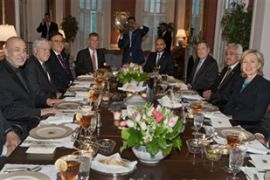US ‘committed to Afghan security’
Clinton and Karzai acknowledge sharp differences as the two countries begin talks.

Clinton and Karzai both offered opening remarks, stressing the positive but also acknowledging that sharp differences have complicated efforts to stabilise Afghanistan and set the stage for an end to the war.
‘Ability to disagree’
“The ability to disagree on issues of importance to our respective countries and peoples is not an obstacle to achieving our shared objectives,” Clinton said.
“Rather, it reflects a level of trust that is essential to any meaningful dialogue and enduring strategic partnership.”
Karzai thanked the US for its contributions since removing the Taliban from power in late 2001, but also cautioned that international forces in his country must do more to avoid causing civilian casualties.
“As two mature nations and two mature governments – by now the Afghan government is mature, too – we will be having disagreements from time to time,” he said.
On Wednesday, the Afghan president will have a three-hour meeting with Obama at the White House.
Relations between Washington and Karzai have been tense since an April speechin which he accused the United Nations, the US and other countries of “manipulating” the results of last year’s presidential and parliamentary elections.
Al Jazeera’s James Bays, reporting from Washington, said that president Karzai had been asked to bring half his cabinet with him and real harding talking was going on behind the scenes.
“They have had a series of working groups, where a member of the Afghan cabinet and his US counterpart, sitting down and looking at the issues. One of those groups is on corruption.
‘Close friend’
Karzai was re-elected after the polls, which most observers said were marred by massive fraud and vote-rigging. The Afghan president insists, however, that vote disruptions had been organised by “foreigners”.
That position had prompted a harsh reaction from Washington, but in a series of recent news conferences, US officials did not mentioned the rift, instead emphasising the “deep ties” between the governments.
On Monday, Richard Holbrooke, the special envoy for Afghanistan and Pakistan, personally greeted the Afghan leader as he landed.
“There was a period where the waters got roiled,” Holbrooke said. “What I will say categorically … that period ended.”
Karl Eikenberry, the US ambassador to Kabul, who had authored a scathing memo that questioned Karzai’s reliability as a partner, flew into Washington with Karzai in a show of unity.
“Afghanistan is a close friend and ally and of course I highly respect President Karzai in that capacity,” he said.
Taliban reconciliation
During the meetings, Karzai will present his “reconciliation and reintegration” plan aimed at convincing Taliban fighters to end the violence.
|
“I think the most important thing is that we first get an Afghan solution crafted by Afghans” General Stanley McChrystal, |
Low-level or “moderate” fighters would be given incentives to lay down their weapons, while Taliban leaders could be offered exile overseas under the terms of the proposal.
“We’re talking about [fighters] … who are afraid of coming back, who don’t have the economic means to come back, or who don’t have the opportunity to reintegrate into their societies,” Waheed Omer, Karzai’s spokesman, said in Washington on Monday.
More than 1,500 tribal leaders are scheduled to gather in Afghanistan later this month for a “peace jirga”, a council which will discuss reconciliation with the Taliban.
US officials have generally backed Karzai’s plan, with General Stanley McChrystal, the commander of US and Nato forces in Afghanistan, saying the programme should offer all Taliban factions a chance to reintegrate.
“I think the most important thing is that we first get an Afghan solution crafted by Afghans, and second, that it be inclusive and it feel fair to everyone,” McChrystal said on Monday.
In March, Karzai said that US officials were reluctant to talk to senior Taliban while the British were not.
“Our allies are not always talking the same language,” he said.
Better governance
Obama, meanwhile, is expected to press Karzai on reducing corruption and improving the government’s capacity to deliver services.
Military commanders are planning a major offensive this summer in Kandahar, Afghanistan’s second city. The campaign will be modelled in part on a similar offensive in Marjah in Helmand province, which started in February.
But US officials acknowledge that the Afghan government has been slow to deliver basic services in Marjah.
David Sedney, a US defence department official, said in congressional testimony last week that there are not enough trained Afghan officials capable of taking over local government in places like Marjah.
The central government is already unpopular in Kandahar, regarded as corrupt and ineffective.
That, coupled with the lack of progress in Marjah, has left many residents of southern Afghanistan unenthusiastic about a similar campaignin Kandahar.